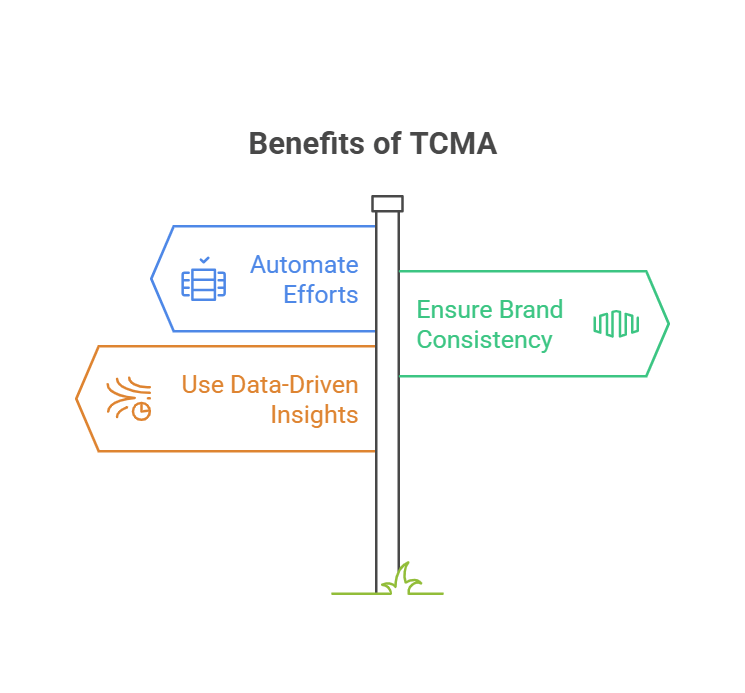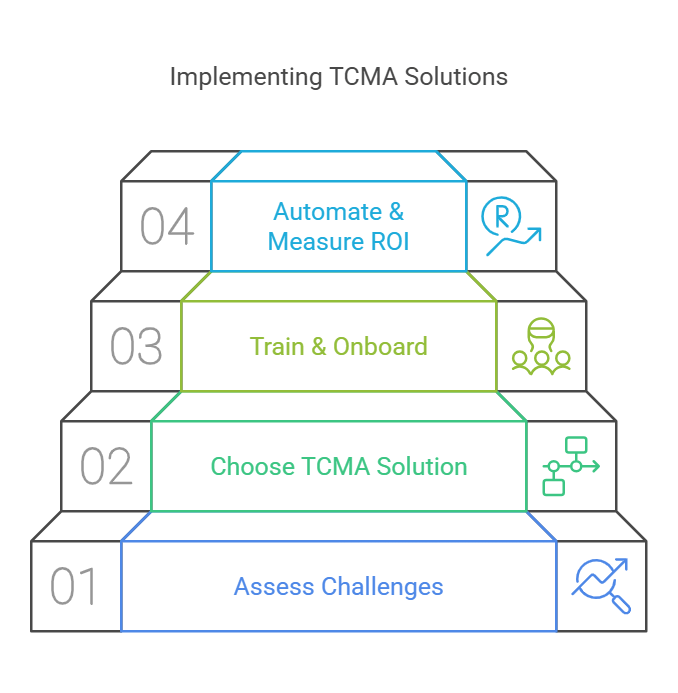The Challenges of Multi-Channel Marketing
Why This Matters
Marketing in today’s hyper-connected world is no longer confined to a single channel. Brands rely heavily on channel data to inform their marketing tactics. Resellers, franchisees, and Affiliates can improve their marketing success by utilizing email marketing automation., and channel partners. To extend their reach, boost sales, and tap into new markets, they must implement channel marketing automation. Local market opportunities. However, this automation reduces the complexity of brand-to-local marketing. The distributed model presents several challenges:
1. Inconsistent branding across different channels: When partners adjust marketing assets, the execution of marketing solutions must remain. Brand-compliant marketing is essential for maintaining a consistent image across all marketing channels. Brand identity can get distorted, leading to reduced customer trust and engagement.
2. Limited visibility into partner-driven campaigns: Execute marketing campaigns effectively to enhance collaborative marketing efforts. Many companies struggle with creating customized marketing plans. Measuring the performance of digital marketing campaigns is crucial for success in managing marketing campaigns effectively. The success of partner marketing initiatives often relies on robust marketing automation software. Without proper channel management, marketing efforts may fail. With centralized insights, it’s difficult to determine ROI, lead quality, and conversion rates.
3. Scaling marketing efforts without losing control: Managing multiple partner marketing campaigns across social media, email, search, and paid channels can quickly become chaotic. Ensuring that all marketing activities remain aligned with the TCMA tool is critical.
Brand-compliant marketing is another significant hurdle for many businesses in their distributed marketing platform.
Enter Through Channel Marketing Automation (TCMA)
Through-channel marketing automation (TCMA) is a strategic solution for implementing through-channel marketing automation. Designed to address these challenges. By leveraging TCMA, brands can:
- Standardizing marketing efforts across all The partner networks is essential for implementing channel marketing automation.
- Automate your social media marketing campaigns. Campaign execution, minimizing manual intervention.
- Enhancing and maintaining brand consistency is essential in all marketing collateral. While still allowing local customization through a distributed marketing platform.
- Track and analyze performance across multiple marketing platforms. Partner ecosystems can benefit from integrated marketing services to enhance collaboration.
What is Through Channel Marketing Automation (TCMA)?

Breaking Down TCMA
Through-channel marketing automation (TCMA) is a technology-driven framework that empowers businesses to execute co-branded, scalable, and automated marketing campaigns across their various marketing activities and partner networks.
It allows brands to:
1. Distribute customized marketing materials to maximize engagement. Marketing content in a controlled yet customizable manner.
2. Automate localized and partner-driven campaigns across various marketing channels.
3. Ensure brand compliance while allowing for tailored, region-specific messaging.
4. Monitor performance in real-time to track ROI and optimize campaigns.
How TCMA Works in a Real-World Scenario
Imagine Microsoft wants to promote a new cloud security product that can help partners improve their marketing plans. Through thousands of partner resellers, you can leverage the channel management platform for better efficiency. Worldwide, businesses are adopting new marketing concierge services. Without TCMA, they would need to rely on marketing tools to manage their campaigns. Each partner creates and executes their own localized marketing campaigns, leading to brand inconsistencies and inefficient execution.
With TCMA, Microsoft can:
- Provide pre-approved marketing materials (ads, email templates, social posts).
- Enable partners to launch automated local campaigns with a single click.
- Analyze marketing performance to execute marketing campaigns effectively. Across all Partners, networks are essential for effective for-partner marketing initiatives from a centralized dashboard.
The Benefits of TCMA for Scaling Marketing

1. Automating Partner Marketing Efforts
- Save Time: Automate repetitive tasks such as email sequences, ad creation, and content distribution with advanced marketing software.
- Reduce Costs: Eliminate the need for manual campaign approvals; partners receive plug-and-play marketing assets.
- Maximize ROI: Ensure every marketing dollar is spent effectively with tracking and analytics to maximize marketing ROI.
2. Ensuring Brand Consistency Across Distributed Channels
Brand inconsistency can erode customer trust, and Lower engagement rates can be addressed through for-partner marketing strategies. With multiple channel partners can leverage through-partner marketing to enhance their reach. Running marketing campaigns and ensuring that messaging, visuals, and promotions remain consistent is critical.
How TCMA Solves This:
1. Pre-approved, brand-compliant content: Partners can only use pre-defined, on-brand materials.
2. Customizable templates: Partners can personalize campaigns while adhering to corporate branding standards.
3. Real-time approvals: Brands can leverage marketing resources to improve their outreach. Review and approve marketing efforts before they go live.
3. Data-Driven Insights for Performance Optimization
Data is the foundation of modern marketing automation. Without real-time insights, brands cannot accurately measure the impact of partner-driven marketing initiatives on sales and marketing effectiveness.
Without TCMA: Businesses lack the visibility to measure partner-led campaigns accurately. Managing marketing initiatives can become chaotic.
With TCMA: Companies gain data-rich insights that can be gathered through effective marketing automation software. Campaign performance, lead quality, and Monitoring conversion trends are crucial for optimizing marketing success.
Top TCMA Metrics to Track:
- Channel sales performance
- Engagement rates across different partner networks
- Cost-per-lead (CPL) and cost-per-acquisition (CPA)
- The ROI comparison between self-run and partner-led campaigns highlights the benefits of through-channel marketing.
Best TCMA Platforms & Tools in 2025

Top 5 TCMA Solutions for Partner Marketing
- Zift Solutions: Enterprise-level TCMA with robust integrations and email marketing automation.
- Impartner PRM: Advanced partner relationship management tools.
- TCMA by Sprinklr: AI-powered analytics and multi-channel automation.
- BrandMuscle: Specializes in localized marketing automation.
- StructuredWeb: Ideal for SMBs scaling partner-driven marketing efforts.
Each platform offers unique features, integrations, and automation capabilities that enhance social media marketing and streamline partner marketing efforts.
How to Implement TCMA for Your Business

Step 1: Assess Your Current Marketing Challenges
- Identify bottlenecks in your current processes.
- Evaluate how effectively partners are using marketing assets.
Step 2: Choose the Right TCMA Solution
- Consider factors such as ease of use, scalability, analytics, and pricing.
- Select a platform that integrates with your existing marketing stack.
Step 3: Train & Onboard Your Partners
- Provide partners with step-by-step guides, tutorials, and automation workflows.
- Implement TCMA adoption programs to ensure successful implementation.
Step 4: Automate Campaigns & Measure ROI
- Set up automated email workflows, paid ads, and content syndication.
- Track performance metrics like click-through rates, lead conversions, and engagement.
Common Objections & How to Overcome Them
Concern 1: Will partners actually adopt TCMA?
Solution: Make onboarding easy with training, incentives, and plug-and-play marketing kits.
Concern 2: Is TCMA challenging to integrate with existing marketing automation solutions tools?
Solution: Most TCMA platforms offer advanced marketing automation tools for better efficiency. Seamless API integrations with CRMs, automation tools, and analytics dashboards.
Concern 3: Will I lose control over brand messaging?
Solution: TCMA provides full oversight, ensuring only pre-approved content is used in managing marketing efforts.
Frequently Asked Questions (FAQ)
1. What is Through-Channel Marketing Automation (TCMA)?
Through-Channel Marketing Automation (TCMA) is a marketing technology solution designed to help brands scale their marketing efforts across multiple channel partners while ensuring brand consistency and efficiency. TCMA enables brands to distribute pre-approved content, automate campaigns, and gain insights into the performance of partner-driven marketing activities.
2. How does TCMA improve brand consistency across partner networks?
TCMA maintains brand consistency by offering partners pre-approved marketing materials that are in line with the corporate identity of the company. Partners are free to personalize campaigns but are limited to utilizing approved templates, logos, and messaging. This centralizes control and prevents any off-brand or unauthorized modifications.
3. Can TCMA help me track partner performance and ROI?
Yes! The benefits of through-channel marketing can enhance our approach. Brands can track key metrics, such as marketing content, across various platforms. Click-through rates (CTR), conversion rates, cost-per-lead (CPL), and ROI across all channel partners, allowing for Data-driven decisions, are crucial for optimizing marketing and sales strategies, especially when utilizing marketing automation helps. And the ability to optimize marketing efforts effectively.
4. Is TCMA difficult to implement?
Implementing TCMA is relatively straightforward, especially if you choose a platform with easy API integrations and user-friendly interfaces. Most TCMA platforms offer step-by-step onboarding, training programs, and support teams to ensure smooth adoption. Additionally, many platforms are designed to streamline marketing operations. Integrate seamlessly with existing CRM systems, analytics tools, and marketing platforms.
5. How does TCMA save time and reduce marketing costs?
TCMA automates many repetitive tasks, such as distributing marketing materials, running campaigns, and generating reports. By automating these processes, businesses can save time, reduce the need for manual work, and decrease marketing costs associated with campaign management. This allows marketing teams to focus on strategic growth instead of tactical execution for corporate marketing.
6. What types of businesses benefit most from TCMA?
TCMA is particularly beneficial for businesses that rely on channel partners, such as resellers, affiliates, franchisees, and distributors, who can benefit from improved email marketing strategies by implementing email marketing automation. It is ideal for SaaS companies that often utilize a marketing automation platform to enhance their services, technology firms, consumer goods brands, and any business that seeks to personalize marketing for better engagement. Scale marketing efforts across a distributed network of partners while maintaining control over branding and marketing execution.
Conclusion
Through-Channel Marketing Automation (TCMA) is an effective solution that allows brands to expand their marketing and sales processes through various channels in an efficient manner. Through automated partner marketing activities, brand consistency, and data-driven analysis, TCMA solves typical business problems in the current digital environment. The deployment of TCMA includes evaluating existing marketing issues, selecting the correct solution, educating partners, automating campaigns, and tracking ROI. By overcoming common objections and leveraging the benefits of TCMA, brands can enhance their marketing strategies and achieve greater success.
